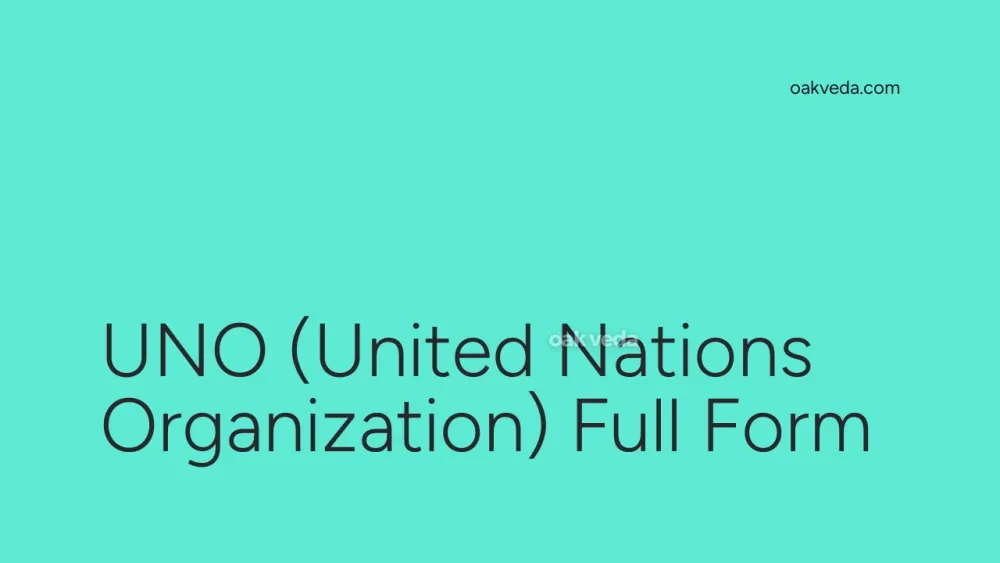
What is the Full Form of UNO?
The full form of UNO is United Nations Organization. This international body plays a crucial role in maintaining global peace, fostering cooperation among nations, and addressing various global challenges.
What is United Nations Organization?
The United Nations Organization, commonly known as UNO or simply the UN, is an intergovernmental organization established in 1945 after the devastating effects of World War II. Its primary purpose is to maintain international peace and security, develop friendly relations among nations, and promote social progress, better living standards, and human rights.
Origin and Development of United Nations Organization
The UNO was founded on October 24, 1945, by 51 countries committed to preserving world peace through international cooperation and collective security. The organization emerged from the ashes of the League of Nations, which had failed to prevent World War II. The UN Charter, signed by the founding members, serves as the constitutional document of the organization.
Since its inception, the UNO has grown to include 193 member states, representing almost all sovereign states in the world. This growth has led to an expansion of its roles and responsibilities, adapting to the changing global landscape and emerging challenges.
How does United Nations Organization work?
The UNO operates through a complex system of organs, specialized agencies, and programs. The organization's work is guided by the purposes and principles contained in its founding Charter. Decision-making processes vary depending on the organ, but generally involve discussion, negotiation, and voting among member states.
The UN's activities cover a wide range of areas, including peacekeeping, humanitarian aid, sustainable development, and the promotion of international law. The organization works closely with its member states, civil society organizations, and other international bodies to achieve its goals.
Functions of United Nations Organization
The UNO serves several critical functions in the international community:
-
Maintaining International Peace and Security: Through its Security Council, the UN can take action on threats to peace, including imposing sanctions or authorizing military action.
-
Promoting Sustainable Development: The UN works towards achieving the Sustainable Development Goals, addressing issues such as poverty, education, and climate change.
-
Protecting Human Rights: The UN promotes and encourages respect for human rights and fundamental freedoms for all.
-
Delivering Humanitarian Aid: In crisis situations, the UN provides food, shelter, and medical care to those in need.
-
Upholding International Law: The International Court of Justice, the UN's principal judicial organ, settles legal disputes between states and gives advisory opinions on legal questions.
Applications of United Nations Organization
The UNO's work has far-reaching applications across various sectors:
- Diplomacy: The UN provides a forum for countries to engage in dialogue and negotiate agreements.
- Conflict Resolution: UN peacekeeping missions help stabilize conflict zones and protect civilians.
- Global Health: Through agencies like WHO, the UN addresses global health challenges and coordinates responses to pandemics.
- Environmental Protection: The UN leads global efforts to combat climate change and protect biodiversity.
- Cultural Preservation: UNESCO works to protect cultural heritage sites and promote cultural diversity.
Features of United Nations Organization
Key features of the UNO include:
- Universal Membership: Nearly all sovereign states are members, making it a truly global organization.
- Six Principal Organs: The General Assembly, Security Council, Economic and Social Council, Trusteeship Council, International Court of Justice, and Secretariat.
- Multilingualism: The UN has six official languages: Arabic, Chinese, English, French, Russian, and Spanish.
- Neutrality: The UN strives to remain impartial in conflicts between nations.
- Specialized Agencies: The UN system includes specialized agencies like UNESCO, WHO, and FAO, each focusing on specific global issues.
Benefits of United Nations Organization
The UNO provides numerous benefits to the international community:
- Global Forum: It offers a platform for countries to discuss and resolve issues peacefully.
- Humanitarian Assistance: The UN provides vital aid to millions affected by conflicts and natural disasters.
- Promotion of Democracy: The UN supports democratic processes and good governance worldwide.
- Scientific Cooperation: UN agencies facilitate international scientific collaboration on various issues.
- Cultural Exchange: The UN promotes intercultural understanding and preserves cultural heritage.
Limitations or Challenges of United Nations Organization
Despite its achievements, the UNO faces several challenges:
- Decision-making Process: The veto power of permanent Security Council members can sometimes hinder decisive action.
- Funding Issues: The organization often faces budget constraints, affecting its operations.
- Bureaucracy: Complex administrative structures can slow down responses to urgent situations.
- Uneven Influence: Larger, more powerful countries tend to have more influence within the organization.
- Enforcement Limitations: The UN lacks its own military force and depends on member states for enforcement.
Future Developments in United Nations Organization
As global challenges evolve, so does the UNO. Future developments may include:
- Reform of the Security Council: Discussions are ongoing about expanding and restructuring the Security Council to better represent the current global order.
- Enhanced Peacekeeping Capabilities: Improving the effectiveness and responsiveness of UN peacekeeping missions.
- Strengthened Climate Action: Increased focus on implementing the Paris Agreement and other climate initiatives.
- Digital Cooperation: Addressing challenges and opportunities presented by digital technologies and artificial intelligence.
- Pandemic Preparedness: Enhancing global health systems to better respond to future pandemics.
FAQs on UNO Full Form
-
What does UNO stand for? UNO stands for United Nations Organization.
-
When was the UNO established? The UNO was established on October 24, 1945.
-
How many member states does the UNO have? As of 2023, the UNO has 193 member states.
-
What are the six principal organs of the UNO? The six principal organs are the General Assembly, Security Council, Economic and Social Council, Trusteeship Council, International Court of Justice, and Secretariat.
-
Where is the headquarters of the UNO located? The UNO headquarters is located in New York City, USA.
You may be interested in:

